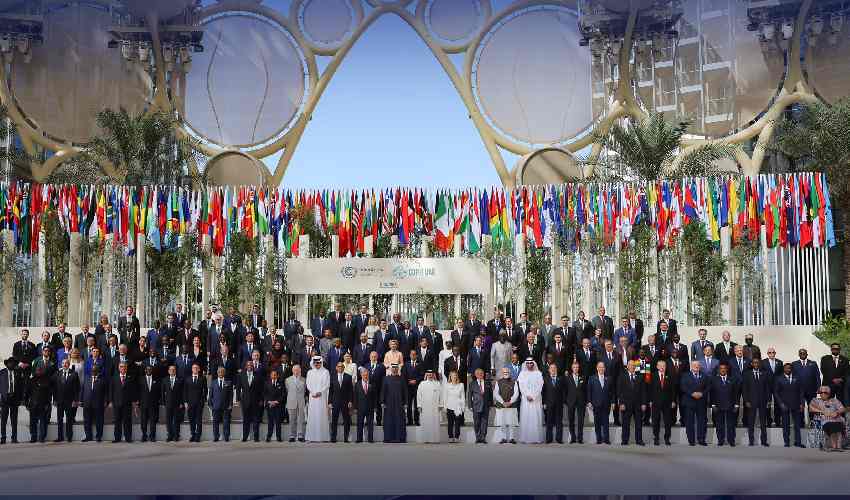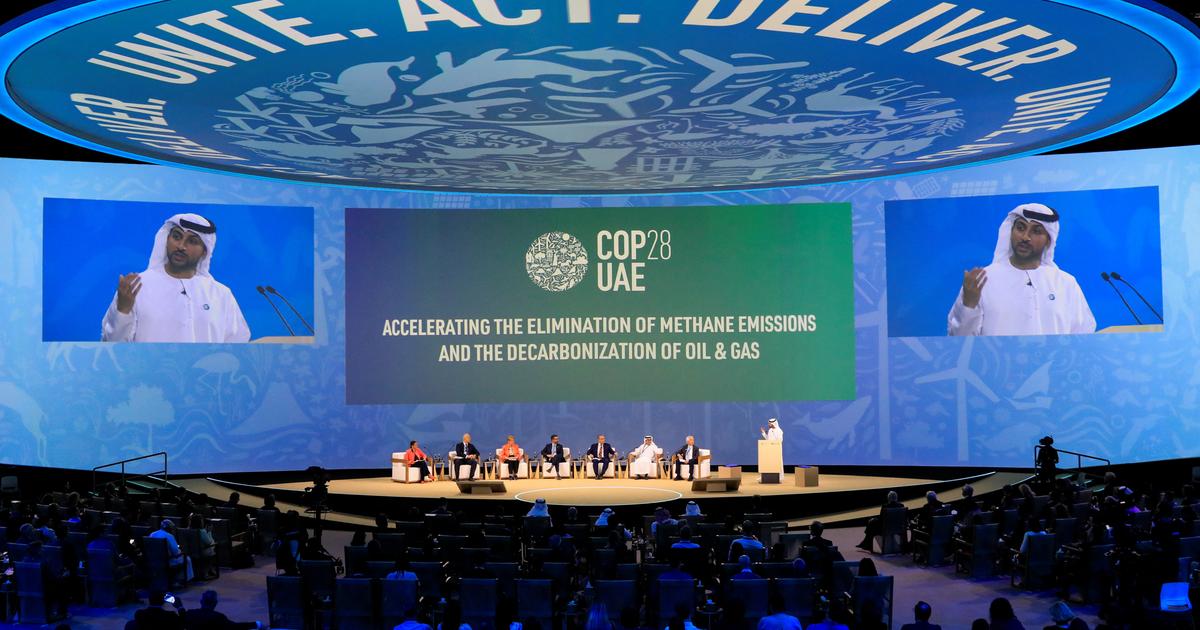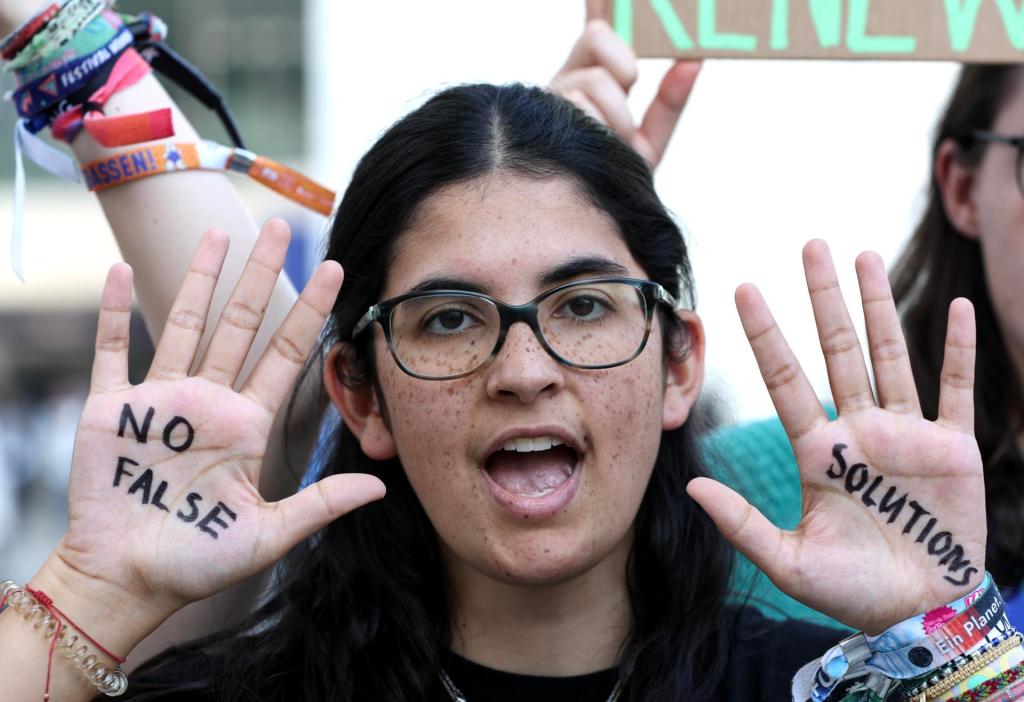ONLINE ACTION TODAY:
A world powered by renewable energy starts today with us.
You can get involved by joining us TODAY at 7PM ET/ 4PM PT and hear our plan for 2024.

COP28: An End to Fossil Fuels?
Cansın Leylim / 350.org
DUBAI (December 13, 20230 — I’ve spent 17 straight days at global climate change negotiations, walking 18,000 coffee-fuelled steps every day across briefings, meetings and protests but at last, we have a conclusion to COP28.
The end of the fossil fuel era is in sight. We now have an international agreement signed by over 200 countries to “transition away from fossil fuels.” [1]
It could be a lot more ambitious. There are plenty of loopholes that need watching.
But the record numbers of coal, oil and gas lobbyists failed. They didn’t want any mention of an end to fossil fuels.
There’s more. A commitment to triple renewable energy by 2030, exactly as more than 30,000 of you demanded.
It’s what we need to head toward 100% renewable energy. Let’s be clear – we need to avoid any new forms of exploitation and pollution as we make this change, and we still need the money to pay for it all.
There’s a long, long way to go. But hope is still alive.
In the weeks running up to COP28, our Global Power Up saw 223 gatherings in 66 countries, as we took to the streets to demand renewable energy and an end to coal, oil and gas.
All through these negotiations, your emails, tweets, social media posts and signatures helped push decision-makers in the right direction.
We can take a moment to feel the hope and the power of the climate movement. Led by people on climate frontlines, like the small island states of the Pacific, this movement is as deep as the ocean and as vast as a rainforest.
And then onwards. We’re not going to wait for politicians.

ONLINE ACTION TODAY:
A world powered by renewable energy starts today with us.
You can get involved by joining us TODAY at 7PM ET/ 4PM PT and hear our plan for 2024.

Background on the Lead-up to COP28
350.org
We’re demanding a world that is 100% powered by renewable energy. That means a rapid end to all coal, oil and gas. It’s a chance to renew our relationship with nature and with each other too. To tackle global injustice as we end pollution and climate chaos.
World leaders will gather in Dubai in December at COP28. They must set a target to triple renewable energy by 2030, to keep us in line with the 1.5C target.
Fossil fuel industry lobbyists will work hard to cling on to power and profits. But we can counter them with a huge show of people power.
Can you add your name to the petition calling for 100% renewable energy, then share it with friends and family? We will bring every name to the UN climate conference in Dubai to show the strength of our movement.
The details:
- We need to get to 100% renewable energy by 2050, which means phase out of fossil fuels by then. Even faster for industrialized, rich countriesfor fairness and equity.
- Globally, we’ll add about 0.44TW (440GW) renewable energy this year. By 2030, we musttriple our total capacityof renewable energy to over 11,000GW which means ramping up yearly deployment to 1.5TW (1500GW) from 2030 onward.
- Double energy efficiency gains(from about 2% to 4%) by 2030.

COP28: Communities Hold the Line as
Outcome Delivers a Loophole-ridden Text
350.org
DUBAI, UAE (December 13, 2023) — At COP28, the fifth and final text of the Global Stocktake made a long overdue concession – finally including language that acknowledges the need to transition away from fossil fuels. While this marks a collective win for and by climate-vulnerable nations and the climate movement, it doesn’t go nearly as far as it needs to.
With no mention yet of how the transition will be funded fairly, once again, the climate movement leaves the COP with only small flickers of hope, instead of the path-lighting beacon that’s long overdue.
“People power has propelled us to the doorstep of history but leaders have stopped short of entering the future we need.” said May Boeve, Executive Director of 350.org, “It is frustrating that thirty years of campaigning managed to get ‘transition away from fossil fuels’ in the COP text, but it is surrounded by so many loopholes that it has been rendered weak and ineffectual.
“The prize is finally on the table – a phase-out of fossil fuels and a world powered by renewable energy – but rather than clearing the way to it, we’ve been presented with yet another set of distracting doors that could still hold oil and gas expansion, and we don’t know just where the finance will come from.”
“The change we have seen in negotiators’ stance is a weak but welcome nod to the communities who have spoken loud and clear over the past few weeks: from Jakarta to New Orleans, Rio de Janeiro to Lamu – 350.org’s community organized campaigns have shown that we are ready to Power Up our own future,” continued May Boeve, “The energy revolution is already underway, as we stand by to build our own power. We hoped this COP would bring international governments to the same building site, and for wealthy nations like Australia, Canada, the EU, the UK and the US to pay their fair share, and support the most vulnerable countries to transition to a 100% renewable future. That would be leadership to match what we’ve witnessed from the small island states, from our Pacific Climate Warriors, and from the youth movement. That is when we can call this a win.”
Powering up renewable energy capacity by 2030 was a key objective from the outset of COP28, and one that 350.org outlined as vital in the landmark report Power Up for Climate Justice: Financing and Implementing a 1.5C-Aligned Global Renewable Energy Target. Both the renewables target and a fossil fuel phase out are essential for ensuring a sustainable future.
COP28 has made some strides in the right direction, setting support for tripling clean energy by 2030, and doubling energy efficiency, in concrete recognition of the plummeting costs of renewables. Now, these targets must be backed up with quantifiable timelines and equitable finance, particularly for the Global South.
The Pacific nations and small island states showed up as always, fighting for solutions, and were in no small measure responsible for COP28’s relative success in the fight against fossil fuels.
A clear pathway, bolstered by a legal framework and timeline for implementation was not part of the final outcome, despite small island states holding the line for a full, fast and fair fossil fuel phase-out, unprecedented support from Latin America, Europe, Australia and some African nations, and support from over 120 countries for a robust renewables deal. Rather than consider the concerns of climate vulnerable nations, the end result uses weak language, is vague on timelines, has few finance commitments, and continues to tilt in favor of major emitters.
Joseph Sikulu, 350.org Pacific Managing Director says,
“While the outcome speaks to transitioning away from fossil fuels and towards renewable energy, change continues to be incremental, not transformational. COP28 promised us an historic achievement and what we have received is a weak outcome with several of our red lines for survival being crossed.
“Our islands deserve more than weak, we deserve concrete actions to stay below 1.5 degrees and the resources to adapt and transition our developing economies.”
“We continue to hold the line with change makers around the world: in the streets where we march to demand climate justice; in frontline communities where we block fossil fuel expansion; in renewable energy cooperatives where we’re creating the future; and in the communities where we nurture care, resilience and change.”

Further Quotes
Peri Dias, Latin America Representative at COP28:
“This year, we were outnumbered by fossil fuel lobbyists. At COP30, Indigenous people, those on the frontline and anyone contributing to climate justice must outnumber fossil fuel lobbyists and blockers. We urge the Brazilian government to start working on an ambitious process that puts people at the center of the climate talks. Now they have two years to make a difference – if the COP process is to deliver on something meaningful, this is the last opportunity”.
“The climate movement has shown its power by achieving the inclusion of the transition away from fossil fuels in the text, albeit 30 years overdue, but we have much more to achieve in the next two years, especially in relation to financing the energy transition, adaptation measures and compensation for Loss and Damage, which are a matter of life and death for regions like Latin America.
“Traditional communities and the most vulnerable populations will demand climate justice even more fiercely in the next two years, to ensure that we have at COP30, in Brazil, the culmination of the urgent advances in these areas”.
Landry Ninteretse, Regional Director, 350Africa.org
“Our expectation was that COP 28 would, at the very least, demonstrate commitment to course correcting and charting a path to a complete phase out of all fossil fuels, a sustainable future built on renewables, ambitious adaptation finance and clear technology transfer commitments by rich nations. The support for the tripling of renewable energy, has ignited optimism and energized communities that have been putting their own power behind the call to power up renewables.
“However the process failed to deliver on the commitment to a full, fast and fair phase out of fossil fuels and was lacking in the climate finance to support adaptation and mitigation in the most climate vulnerable nations. To truly deliver climate justice, the biggest polluters must lead on the phase-out and commit to supporting the deployment of renewable energy in Africa”.
Agnes Hall, Global Campaigns Director at 350.org says:
“There were at least 2,456 fossil fuel lobbyists at this COP. Yet they could not stop the end of the fossil fuel era. They’ve managed to sneak in loopholes to derail the climate talks once again, but their massive presence tells another story: they are scared because they know their time is over. They are pouring all their resources and all their power in a last all-in effort to try and save their business model one last time.
“The fossil fuel industry was represented up to the level of the COP28 presidency. While Dr. Sultan Al Jaber has sent mixed messages on fossil fuel phaseout throughout the negotiations, this final outcome is not the historic deal he promised. There are many leaders accountable for this, and they shall be held to account. The French Government invited Patrick Pouyanné (CEO of TotalEnergies) to be part of the French delegation. They gave him access to the climate talks, and let him actively work against our collective interest, for the sake of saving TotalEnergies’ blood oil, blood gas and blood profits.
“We are calling on the UNFCCC and future COP presidency to implement a conflict of interest policy, and ban fossil fuel lobbyists from the climate talks, just like the WHO Framework convention on Tobacco Control bans representatives from the tobacco industry.
Andreas Sieber, Associate Director of Policy and Campaigns at 350.org says:
“This text is a step forward on our path towards phasing out fossil fuels, but is not the historic decision we were promised. Despite the record number of fossil fuel lobbyists in attendance, and a COP president who is the CEO of an oil company, civil society and more than 100 countries have won an agreement to rapidly move away from fossil fuels this decade.
“But given the overwhelming momentum among countries in support of a renewable energy package and a long overdue fossil fuel phase out, we needed a far more ambitious result.”
JL Andrepont, US Policy Lead at 350.org says:
“This drafted text is a distinct improvement upon the first release and includes some key commitments that are history-making in their achievements. But, let’s be clear: the bar was incredibly low. We know that we can only keep our climate goals within reach if we begin a fast, fair phase-out of all fossil fuels, without relying on dangerous distractions like carbon capture and hydrogen.
“Those false solutions will enshrine the fossil fuel industry and will keep us from sufficiently being in solidarity with all frontline communities who are bearing the brunt of the climate crisis.
“The small island nation states made it clear that the richest nations, like the US, have the power to keep their communities and 1.5 alive and this agreement, while not enough, is a strong step in that direction. However, we must do more. The US must power up renewable energy and keep to its global financial commitments to support adaptation and mitigation around the world and at home. It is past time for the US to take real responsibility for its role in the climate crisis. Our fight continues.”
Masayoshi Iyoda, Japan Campaigner, 350.org
“While the agreement at COP28 of tripling renewable energy and doubling energy efficiency is encouraging for climate activists in Japan, it gives homework to fossil-addicted nations including Japan to accelerate a fair and fast transition away from all fossil fuels by 2030.
“The COP decision leaves some room for dangerous distractions such as nuclear, CCS, and transition fuels that could prolong the lifetime of fossil fuel infrastructure. Still, people power will never be defeated by such delay tactics. The science is clear enough. Japan must contribute to the 1.5 goal by committing to the phaseout of all fossil fuels in its national ‘Basic Energy Plan’ and provide support for community-led renewable energy in Japan, the Asia region, and everywhere in the world.”
Lisa Rose, Associate Director, 350.org Europe
“COP28 will be remembered as the first COP to finally include a transition away from fossil fuels in its outcomes. But ultimately, COP28 has failed to deliver on the full, fast, fair and funded fossil fuel phase-out the world needs. The EU claims to be a climate leader, but it now needs to walk the talk – EU Commissioner of Climate Action Wopke Hoekstra must push for a real phase-out of all fossil fuels, and European countries and institutions must drastically step up their financial support to vulnerable countries.”
Joseph Sikulu, 350.org Pacific Managing Director says,
“While the outcome speaks to transitioning away from fossil fuels and towards renewable energy, change continues to be incremental, not transformational. COP28 promised us an historic achievement and what we have received is a weak outcome with several of our red lines for survival being crossed.
“Our islands deserve more than weak, we deserve concrete actions to stay below 1.5 degrees and the resources to adapt and transition our developing economies. While it does acknowledge the root cause of the climate crisis – fossil fuels – it again fails to phase out coal, oil and gas.
“While it does acknowledge the need to triple renewable energy, it fails to set a clear quantitative goal. It is not enough for us to reference the science and then make agreements that ignore what the science is telling us we need to do. We will not let the future of the Pacific fall through loopholes like “abatement” and “transitional fuels”, and we will hold countries like Australia accountable, who continue to delay a true phase-out with dangerous distractions.
“Every year, we travel across oceans to come to these negotiations and fight tooth and nail to keep 1.5 alive, and it is clear that climate vulnerable countries and frontline communities are the ones doing the heavy lifting. ”